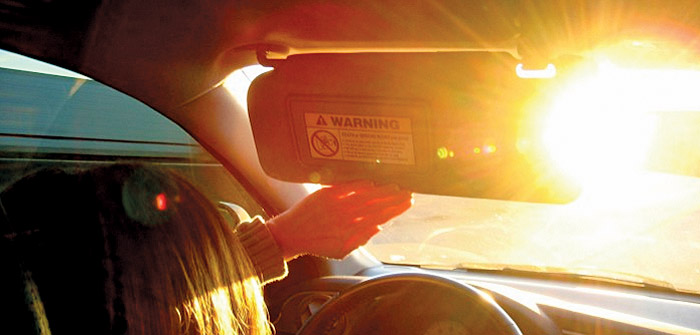(Photo, Submitted)
Being in the eye care field we are well-versed in the studies that demonstrate that great vision leads to great performance. Plus, in our eyecare practice we see examples daily that support the literature that clear efficient sight improves classroom, sports and workplace success.
That said, we want to discuss a couple of environmental factors that can diminish our otherwise good sight and visual performance: one that we hope is behind us — smoky skies and the other Autumn Equinox that increasingly puts the sun right in front of us as we are driving to work or school. While we are not likely to change the seemingly annual smoky skies anytime soon nor will we ever change the placement of the sun this time of the year, we offer several suggestions to minimize these environmental factors affecting our vision.
Tips to Protect Eyes During Our Smoky Season
Two Pacific University College of Optometry Professors recently offered helpful suggestions to those experiencing eye problems resulting from prolonged smoke exposure. They shared comments based upon their field and clinical experience working with fire crews and individuals that suffer most during smoky environments. These suggestions are helpful to all of us, when air quality is poor due to our smoky times.
Specifically, Doctors Doll and Buckingham from the College of Optometry advise taking extra precautions when air quality is poor due to high levels of smoke, including:
• Immediately when you return from being outdoors, use non-preservative eye drops. This will remove the microscopic air particulates that can stay on the lids and adversely affect tear quality.
• Be sure to wear protective sunglasses, to shield the eyes from the increased glare due to increased particulate matter.
• Make sure air conditioners are set to recirculate air, and point the vents or fans away from yourself, as they can also dry out eyes, especially during sleep.
• Limit the use of smartphones or tablets, which can keep you from blinking regularly.
Blinded by the September Light
Each year at the end of summer when I drive east into the low sun I’m often suddenly “blinded” by the combination of looking directly into the early morning sun and the glare from my dirty windshield. So each year I share with our patients and the readers of CBNews what driver safety experts tell us about the glare of September sun. This time of the year the morning sun during our commute times is not only bothersome but potentially dangerous for drivers. Studies reveal a shocking three times the number of glare-induced auto-related accidents in the month of September compared with any other month.
Furthermore, 80 percent of these glare-induced auto-related accidents occur in the early morning or early evening when the sun is low. So it’s important to drive with extra caution during September as there are many schools on our major east-west routes in Bend.
Here are some common sense recommendations to reduce your chances of being a glare induced “accident statistic.”
• Keep your windshield extra clean, inside and out. (When the direct sun hits a dusty or smeared windshield it is nearly impossible to see beyond your dirty windshield!)
• Wear high quality polarized sunglasses. Polaroid lenses will dramatically reduce reflected glare (However even the best Polaroid can’t cut through the glare of a dirty windshield)
• Use your visor to help block some of the direct light
• Don’t put reflective items on the dashboard
• Never text while driving or you would be driving “double blind”
While we can’t change the position of the sun during the September equinox, we all can attempt to make our roads safer by keeping our windshields clean — inside and out — and by attempting to eliminate all driving distractions.
These tips are offered to you by the doctors and staff of Integrated Eyecare, official sponsors of the Umpires of the Bend Elks Baseball team. “If you can’t see the ball, you can’t make the call.”





